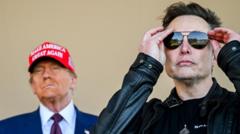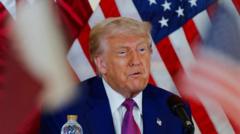Elon Musk's vocal opposition to a bipartisan funding bill derails attempts to prevent a government shutdown, highlighting a turbulent political landscape within the Republican Party.
**Musk's Impact on Congress Raises Questions Amid Shutdown Talks**

**Musk's Impact on Congress Raises Questions Amid Shutdown Talks**
Tech Mogul's Influence Reverberates in D.C. Budget Negotiations
In a surprising turn of events, tech billionaire Elon Musk has exerted considerable influence over congressional proceedings by vocally opposing a bipartisan stopgap spending bill aimed at funding US government operations. In an unexpected twist to the ongoing budget negotiations, Musk leveraged his significant social media presence and connections to rally conservatives against the proposed agreement, exacerbating divisions within the Republican Party.
On Wednesday, Musk took to X, where he lambasted the spending compromise led by House Speaker Mike Johnson, causing dissent among Republicans. By evening, former President Donald Trump echoed Musk’s sentiments, bemoaning the bill for perceived wasteful spending and Democratic priorities, effectively galvanizing parties against the measure.
As a result, support for the stopgap bill collapsed, leading to last-minute attempts by Republican leaders to propose a new funding package. However, Musk's influence has drawn attention to the fragility of the current GOP majority in the House, revealing internal tensions that could further complicate legislative efforts moving forward.
While some Republicans anticipated a united front under Trump's leadership, the discord highlighted by Musk’s interventions underscores an inherent instability within the party. This week’s developments suggest that without unity, Republicans may struggle to succeed legislatively, facing potential challenges not only from within but also amid the pressures of external influences like Musk and Trump.
Should Republicans fail to align on key issues, they risk jeopardizing not only the funding measures but also Trump's broader legislative ambitions upon taking office. The unfolding drama indicates that continuing divisions may threaten effective governance, putting the party's future in question as they prepare for the challenges ahead.
Tom Johnson’s authority as Speaker is under significant scrutiny, as recent events have showcased vulnerabilities within his leadership just weeks before a pivotal election for his position. The question remains: can the Republican Party navigate this political turbulence while staying true to their agenda, or will outside influences derail their efforts?
On Wednesday, Musk took to X, where he lambasted the spending compromise led by House Speaker Mike Johnson, causing dissent among Republicans. By evening, former President Donald Trump echoed Musk’s sentiments, bemoaning the bill for perceived wasteful spending and Democratic priorities, effectively galvanizing parties against the measure.
As a result, support for the stopgap bill collapsed, leading to last-minute attempts by Republican leaders to propose a new funding package. However, Musk's influence has drawn attention to the fragility of the current GOP majority in the House, revealing internal tensions that could further complicate legislative efforts moving forward.
While some Republicans anticipated a united front under Trump's leadership, the discord highlighted by Musk’s interventions underscores an inherent instability within the party. This week’s developments suggest that without unity, Republicans may struggle to succeed legislatively, facing potential challenges not only from within but also amid the pressures of external influences like Musk and Trump.
Should Republicans fail to align on key issues, they risk jeopardizing not only the funding measures but also Trump's broader legislative ambitions upon taking office. The unfolding drama indicates that continuing divisions may threaten effective governance, putting the party's future in question as they prepare for the challenges ahead.
Tom Johnson’s authority as Speaker is under significant scrutiny, as recent events have showcased vulnerabilities within his leadership just weeks before a pivotal election for his position. The question remains: can the Republican Party navigate this political turbulence while staying true to their agenda, or will outside influences derail their efforts?




















